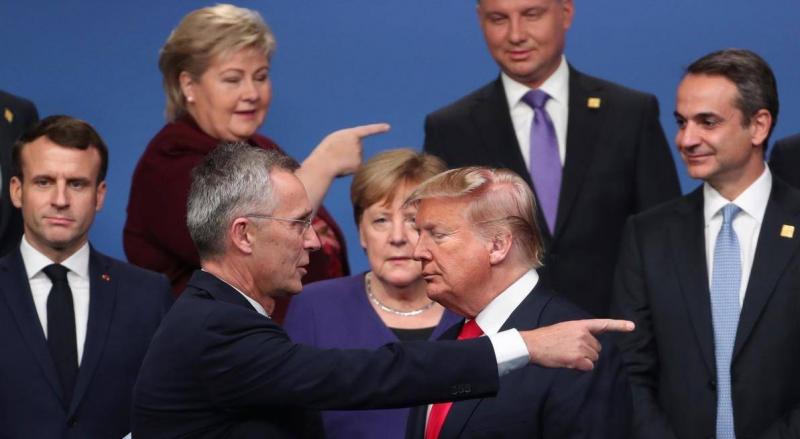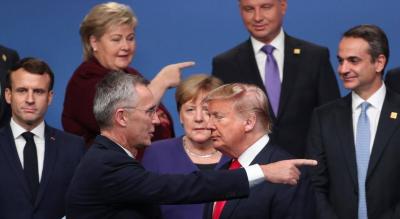European leaders are striving to adopt an approach that appeals to former U.S. President Donald Trump and his supporters in the Republican Party regarding commitments to NATO, despite their insistence not to fully submit to his wishes. Trump faced severe criticism from Western officials due to his statements indicating he would not protect countries that fail to meet NATO's defense spending target and would encourage Russia to attack those nations.
Earlier this week, Trump's remarks, as the leading candidate for the Republican nomination in the upcoming presidential election, overshadowed the Munich Security Conference, a major annual gathering of politicians, military officials, and diplomats that often serves as a gauge of U.S.-European relations. European leaders are increasingly concerned not only about the future of NATO if Trump defeats current President Joe Biden in the November elections but also about the delay of a $60 billion aid package for Ukraine in the U.S. Congress, where Republicans are demanding border security measures in exchange for approving the bill.
Ukrainian and Western leaders emphasize the importance of this aid package as Kyiv's forces face challenges nearly two years after the Russian invasion. Moscow announced today that it has fully captured the devastated town of Avdiivka in eastern Ukraine. European leaders are engaging with U.S. Congress members, business leaders, and think tanks in their efforts to influence Trump's camp, which began even before his controversial statements.
Among the arguments presented by European leaders to support their position is that European countries are spending more on defense and intend to do even more, and that such spending and financial aid to Ukraine are generating billions for American defense companies. They argue that defending Europe reflects U.S. strength against China, which has been a central focus of Trump's foreign policy. German Chancellor Olaf Scholz stated at the conference held at the luxury Bayerischer Hof hotel, attended by dozens of U.S. lawmakers, "We Europeans need to pay more attention to our security now and in the future." He added, "The readiness to do so is a great deal."
**NATO Interests, Not Trump's Interests**
Scholz and other European leaders, such as Dutch Prime Minister Mark Rutte, a favored candidate to be the next NATO president, emphasized that they are taking defense more seriously because it benefits their interests, not because of Trump. However, they aim to convince Trump and his followers that remaining in NATO, as he did during his presidency despite his public criticisms, will also be beneficial for them. Norwegian Prime Minister Jonas Gahr Støre told Reuters in Munich, "It's in the U.S. interest to be part of NATO with strong allies that can enhance U.S. influence."
At the end of last month, NATO Secretary-General Jens Stoltenberg traveled to the United States, partly aiming to convince Trump's camp to remain in the alliance and support Ukraine. He delivered a speech at the Heritage Foundation, a think tank supported by Trump in Washington, and visited a Lockheed Martin factory in Alabama that manufactures Javelin anti-tank missiles. Stoltenberg noted in Munich, "Most of the money allocated to Ukraine ultimately ends up in the United States through arms purchases, for example, Javelin missiles produced in the U.S." He referenced U.S. concerns about China, saying, "The U.S. represents 25% of the world's GDP. Together with our NATO allies, we represent 50% of the world's GDP and 50% of global military power. If we maintain our unity, we will be safe."
**Europe Fears Russia While Maintaining Good Relations with America**
European leaders argue that the increase in their defense spending reflects a growing belief that Russia now poses a significantly greater security threat. They add that it also reflects a growing perspective among European governments that they will need to take more responsibility for their security in the coming years, regardless of who wins the next U.S. presidential election. Latvian Foreign Minister Edgars Rinkēvičs stated, "I believe that over time, the United States will be less inclined to feel that it should guarantee European security fully."
NATO expects that 18 out of its 31 member countries will meet the goal of spending 2% of their GDP on defense this year, up from 11 countries in 2023. Among the countries expected to meet this target are Germany and France, the two largest economic powers in the European Union. According to NATO estimates, the United States spent about 3.5% of its GDP on defense in 2023.




